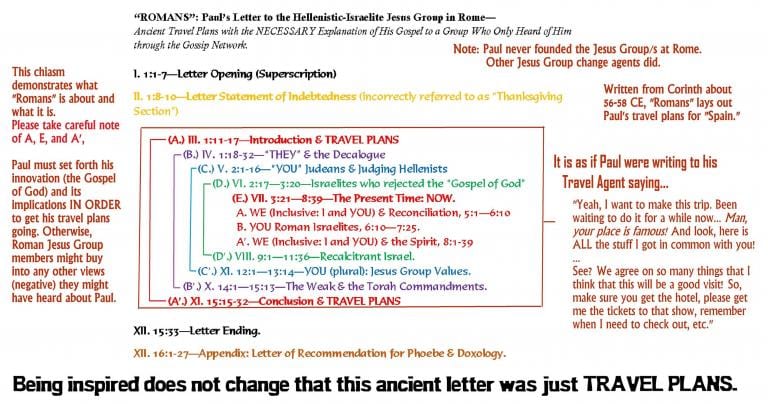
Romans 9—11 offers challenges to American Christian individualistic complacency.
This past Sunday, we read from Paul, specifically Romans 9:1-5. People who created the Lectionary tore the second reading bleeding out of context from “Romans.” But don’t make too much of a big deal about that. Because for what seems like forever, Christians of all stripes have enjoyed making way too much of a big deal out of this authentic letter of Paul. It’s ironic, given that it was not intended as some grand theological treatise it gets touted as. It was only designed to be Mediterranean-style travel arrangements, folks.
Inspired? Sure! “Romans” is inspired. But that doesn’t change what it is. Inspired travel arrangements remain travel arrangements even under God’s nonviolent breath. Just like the Incarnation doesn’t make Jesus Superman, but man. Grace builds on nature, right? It doesn’t eliminate it.
Watch the video here for a breakdown of Paul’s authentic writings—
Paul’s Stance on Gentiles in Romans 9—11
Christians have literally fought wars over this document called “Romans,” folks. It’s a tragedy. Here is an outline of “Romans”—

Contrary to popular Christian ideas generated by spurious facts, Paul didn’t really care about non-Israelites. He merely tolerated Gentiles, who were Jesus group people, especially in a community he’d never formed or been to before. Communities like the Roman Jesus groups.
But Paul tolerating Gentiles is a far cry from Paul desiring Gentile proselytes. The real Paul was ethnocentrically particular to Israelites. God took that. God cooked that in time and human freedom over the centuries. Something resulted that the historical Paul could never have desired or expected. Consequently, the Body of Christ became Gentile, something Paul would have called “contrary to nature.” And contrary to his own “nature” (i.e., custom), Paul would eventually be known as “apostle to Gentiles.” That is a messy inspiration, indeed!
The Roman Jesus groups apparently had Gentile believers. How did that happen? Since impersonal causality was inconceivable to Paul or any first-century person, it must be the God of Israel who did that. But why would Israel’s God do such a thing? Answering that is what Romans 9—11 is all about.
The Audience of Paul and Romans 9—11
Read carefully Romans 9—11. See how Paul depends on Israelite Scriptures (what we call “Old Testament”)? Would any first-century non-Israelite Mediterranean reading this letter understand his Israelite references? That says a lot about to whom he is actually writing. Take care that your theological commitments don’t distort Paul into being an inconsiderate author. Paul knew his audience. Pity is, we Christians don’t.
Anyway, the irony is thick. Paul uses Scripture to say that God included Gentiles into the Jesus group resulting in Israelites (the chosen people) being excluded. How ironic! The fact was that despite Paul’s best efforts, the majority of Israelites everywhere rejected Jesus as Messiah. Even the people who received Paul’s innovation (his “Gospel of God”) reinvented it, much to his bitter frustration. Most everyone misunderstood Paul, and we continue this revered “c” catholic tradition. Keep in mind that Paul never sought out Gentiles. Watch that spurious familiarity.
Paul & Cosmic Forces
Most Israelites rejected Jesus and Paul suffers depression and anguish. This is because to Paul, his Israelite brothers and sisters rejected Theocracy, something promised long ago. Nothing can separate Israelites from the ingroup-glue love of their Patron God, says Paul. Nothing. Not even the astral deities he lists in Romans 8:38-39 can do that.
These sky beings, archai (principalities), dynameis (powers), exousiai (dominations), and kyriotetes (lordships), are also featured in the book of Revelation. Ancient Mediterranean sky lore calls them decans. These decans were 24 astral gods who ruled over every ten (deka) degrees of the Ecliptic pathway or Zodiac in the interior of the imagined sky vault.
These astral beings became absorbed into the Israelite Jesus groups. They thus became kingly “elders” around the sky vault throne of God (Revelation 4:10). No, these are not Apostles and Patriarchs, and indeed not Catholic priests, although they often get passed off as such by Catholics. They can’t be because they aren’t even human, folks. As it turns out, the book of Revelation isn’t about the future, but rather about the skies as ancient Israelites understood them. Look here…
Nothing Can Separate…
Paul might have been in disagreement with John the Seer (Revelation 1:9). This is because at least Paul understood these astral deities as being malevolent. This differs from how John the Seer saw them. Yes, folks, New Testament writings disagree on several issues. And context matters.
Paul’s point in Romans 8 is that nothing earthly or cosmic can sunder the loyal Israelite from the sticky, ingroup-glue love of God. No astral being, not even personified Death, can deny an Israelite client in the broker Messiah Jesus access to the Patron God.
But what about an Israelite who rejects the gift, thereby shaming God (i.e., Biblical sin)?
The One Exception in Romans 9—11
In Romans 9:1-5, Paul laments over Israel’s failure to be loyal to God and God’s gospel. For Paul, the seven great gifts of adoption, honor, covenants, Torah, worship, and the promises, and the patriarchs belong to Israel. He adds another, Messiah. For Paul, these are Israelite realities—this tips us off to whom he is actually addressing in “Romans” (it ain’t Gentiles). But Paul agonizes over the fact that most Israelites have abandoned these gifts in rejecting Jesus.
Notice how Paul insists that he’s telling the truth? This Jesus group doesn’t know Paul, and Paul had plenty of haters inside the various Jesus groups who did know him. Much negativity percolated throughout the gossip network of these early Jesus groups. And Mediterraneans expected secrecy, lying, and deception because these were acceptable strategies to preserve honor. That’s why Jesus and Paul always are swearing oaths, thereby placing themselves under a curse. They must assure their listeners that they tell what is not false. The curse guarantees it.
There is no greater curse for a collectivistic, group-centered personality like Paul than to be cut off from his or her own people. To be rejected by your ingroup is a death-sentence in the cultural world of the Bible. That’s how deadly serious Paul is about being alienated from his Israelite kindred. Throughout his letters, Paul is always concerned about group-boundaries, who belongs in and who should be rejected (e.g., 1 Corinthians 5:2).
Conscience According to Paul and Romans 9—11
Note also that when Paul talks about conscience, he doesn’t mean Jiminy Cricket. Nor does he refer to Freud’s superego, or anything psychological, such as the internal guard that monitors a Western personality’s own behavior. Paul, like everyone in the New Testament, was an anti-introspective collectivist. As such, Paul had no internalized set of rules he must follow to avoid suffering guilty feelings. Paul, never for one day in his life, experienced psychological guilt. In fact, psychological guilt is unknown in the Bible.
In the Scriptures, conscience means the knowledge (scientia) shared with (con) others in the same social ingroup. It means the commonly shared awareness of all insiders of a group. This is Mediterranean collectivistic conscience, and therefore conscience to Mediterranean Israelite Paul. In this way, conscience exists to preserve stable and secure the kinship network, or faction, or village.
Paul’s Kinship Network in Romans 9—11
Who is Paul’s kinship network or group? Romans 9:3 tells us—it’s Israelites. Therefore Paul is afflicted by significant pain and sorrow over their rejection of Jesus Messiah. Because Gentiles would enter the Jesus groups contrary to nature as Israelites shamefully reject the invitation to join is heartbreaking for Paul.
This all gets lost in the violence done to these Scripture segments by designers of our Lectionary. Added to this, violence is the problem of American individualism. American culture is the most individualistic of all time. Therefore we become double-blind to Paul’s collectivistic concerns. We likewise miss the collectivistic experience of Sunday’s Gospel (Matthew 14:22-33). Twelve disciples share an altered state of consciousness experience of Jesus walking on the Sea Demon.
The Challenge for American Christians
American Christians are individualists. We cannot become collectivists or abandon our cultural values. Be that as it may, the New Testament cannot be anything other than a library written for, by, and about collectivists. Therefore it challenges us to be sensitive to problems suffered by the group. Ultimately, will we be attentive to this foreign wisdom?
We are not doing too well here, folks. Just take a glance at the cataclysmic problems in the United States and the world at large. One wonders by the typical American response to COVID-19 and many other issues if our individualism is sustainable. If we are not careful, it will bring about extinction.











